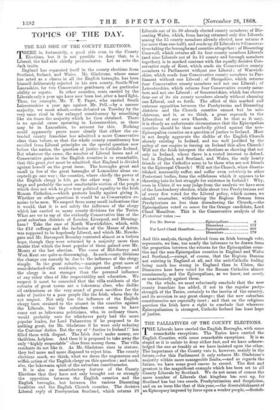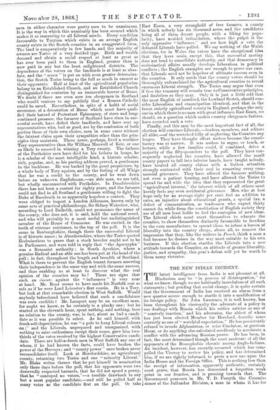THE PALLIATIVES OF THE COUNTY ELECTIONS.
THE Liberals have carried the English Boroughs, with some remarkable exceptions. The Tories have carried the English Counties, with some remarkable exceptions. It is as stupid as it is unfair to deny either fact, and we have acknow- ledged the one as frankly as we have insisted upon the other. The importance of the County vote is, however, mainly in the future,—for this Parliament it only reduces Mr. Gladstone's majority within more manageable limits,—and as regards the future, we have some good omens to record. The first and greatest is the magnificent example which has been set to all County Liberals by Scotland. We do not mean of course the mere number of Liberals that kingdom has sent up, for Scotland has but two creeds, Presbyterianism and Scepticism, and on an issue like that of this year,—the disestablishment of an Episcopacy imposed by force upon a weaker people,—Scotch- men in either character were pretty sure to be unanimous. It is the way in which this unanimity has been secured which makes it so reassuring to all Liberal minds. Every condition favourable to Toryism which exists in an average English county exists in the Scotch counties in an exaggerated form. The land is comparatively in few hands, and the majority of owners are Tories of a very decided type. Birth and wealth demand and obtain a social respect at least as great as has ever been paid to them in England, greater than is now paid in any but the least enlightened districts. The dependence of the voters on the landlords is at least as abso- lute, and the " screw " is put on with even greater determina- tion, the Scotch Tories being to the full as much in earnest as their opponents. Half at least of the agricultural population belong to an Established Church, and an Established Church distinguished for centuries by an immovable horror of Rome. We doubt if there are even now ten clergymen in Scotland who would venture to say publicly that a Roman Catholic could be saved. Nevertheless, in spite of a habit of social reverence, of a detestation of Rome which must have quali- fied their hatred of Protestant Episcopacy, of stern and long- continued pressure, the farmers of Scotland have risen in suc- cessful revolt, have defied their landlords, and have sent up representatives who, bad or good, are by the confession of both parties those of their own choice, men in some cases without the faintest claim upon their sympathies other than the prin- ciples they maintain. There never, perhaps, lived a worthier Tory representative than Sir William Maxwell of Keir, or one so likely to succeed in winning a Tory county. The fathers of the Perthshire men have died for his fathers in heaps, he is a scholar of the most intelligible kind, a historic scholar, rich, popular, and, as his parting address proved, a gentleman to the backbone. He was backed by the great proprietors, by a whole body of Tory squires, and by the feeling of all Whigs that he was a credit to the county, and he went down before an unknown Englishman,—an able man, we are told, but wholly unconnected with Perthshire. In Dumfriesshire there has not been a contest for eighty years, and the farmers could not find in all Scotland a gentleman willing to fight the Duke of Buccleuch in so apparently hopeless a contest. They were obliged to import a London Alderman, known only by some acts of practical philanthropy, Sir Sidney Waterlow, who, according to Lord Dalkeith, could not pronounce the name of the county, who does not, it is said, hold the national creed, and who will probably be a most useful but undistinguished member of the House of Commons. He was carried, in the teeth of extreme resistance, to the top of the poll. It is the same in Roxburghshire, though there the successful Liberal is of historic name ; in Aberdeenshire, where the Tories quoted Ecclesiasticus to prove that a stock breeder ought not to be in Parliament, and were told in reply that "the Apocrypha" was a Romanist authority ; in South Ayrshire, where a genuine Radical and an able one has been put at the head of the poll ; in fact, throughout the length and breadth of Scotland. What is there to prevent the English tenant farmers asserting their independence in the same way and with the same success, and thus enabling us at least to discover what the real opinion of the counties may be ? There are signs that such an enteute against the " influences " is very near at hand. Mr. Read seems to have made his Norfolk seat as safe as if he were Lord Leicester's first cousin. He is a Tory, but look at that remarkable election in West Suffolk. Would anybody beforehand have believed that such a candidature was even credible ? Mr. Lamport may be an excellent man, for aught we know, as he certainly is a plucky one ; but he started at the eleventh hour, spent nothing, said nothing, bore no relation to the county, was, in fact, about as bad a candi- date as it was possible to select. As he said himself, with frank self-depreciation, he was " a pole to hang Liberal colours on ;" and the Liberals, unprepared and unorganized, with nothing to raise enthusiasm except their cause, gave him two- thirds of the votes received by the highest Conservative candi- date. There are half-a-dozen men in West Suffolk any one of whom, if he had known the facts, could have broken the power of the Herveys ; and " county power " once broken never reconsolidates itself. Look at Herefordshire, an agricultural county, returning two Tories and one " minority Liberal." Mr. Blake writes thence that he put himself in nomination only three days before the poll, that his opponents were two deservedly respected baronets, that he did not spend a penny, that he " conveyed no voters,"—a terrible drawback to any but a most popular candidate,—and still he polled half as many votes as the candidate first on the poll. Or take East Essex, a very stronghold of free farmers, a county in which nobody has six thousand acres, and the candidates being all of them decent people, with a liking for popu- larity, have avoided intimidation, where the pulpit is the only oppressive " influence," and see how high a vote the defeated Liberals have polled. We say nothing of the Welsh elections, for in Wales the voters have the exceptional idea that they have souls, except this, that successful mutiny does not tend to consolidate authority, and that democracy in ecclesiastical affairs usually develops Liberalism in political conflicts ; the English examples are enough to prove our case, that Liberals need not be hopeless of ultimate success even in the counties. It only needs that the county voters should be thoroughly enfranchised for the agricultural counties to reveal enormous Liberal strength. The Tories may argue that even if free the tenantry will remain true to Conservative principles, and doubtless so they may. Only it is just a little odd that the most English of mankind, the Lowland Scotch, should con- sider Liberalism and emancipation identical, and that in the freest strictly agricultural county in England, perhaps the only one in which there is no man with great influence, East Essex, we should, on a question which makes country clergymen furious, have recorded such a vote.
Finally, and this may be the most important fact of all, the election will convince Liberals,—leaders, members, and editors all alike,—of the wretched folly of neglecting the Counties any longer. They have thought effort useless because the consti- tuency was so narrow. It was useless to argue, or teach, or lecture, while a few families could, if combined, drive a majority of the fifty-pounders to the poll. They have con- sequently neglected the counties, have allowed the small county papers to fall into inferior hands, have taught nobody, have treated all county claims with a listless attention strongly contrasted with their zeal in removing every com- mercial grievance. They have offered the farmers nothing, not even a patient hearing, and have allowed the Tories to spread far and wide the idea that they represented the great " agricultural interest," the interest which of all others most keenly feels any even accidental grievance. Men who at best hope only for an average eight per cent. feel an addition to rates, an injustice about educational grants, a special tax, a defect of communication, as tradesmen who expect thirty cannot do, while from the constitution of English society they are of all men least liable to feel the contagion of new ideas. The Liberal chiefs must exert themselves to educate the counties, to show themselves distinctly favourable to freedom in the corn manufacture, to spread ideas, to infuse a leaven of liberality into the country clergy, above all, to remove the impression that they, like the writers in Punch, think a man a fool because he dresses in the way most suitable to his own business. If this election startles the Liberals into a new attitude towards the Counties, an attitude of greater liberality, justice, and sympathy, this year's defeat will yet be worth to them many victories.







































 Previous page
Previous page